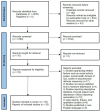Role of social support in poststroke depression: A meta-analysis
- PMID: 36213910
- PMCID: PMC9539912
- DOI: 10.3389/fpsyt.2022.924277
Role of social support in poststroke depression: A meta-analysis
Abstract
Poststroke depression significantly affects health and quality of life of stroke patients. This study evaluates the role of social support in influencing poststroke depression. The literature search was conducted in electronic databases and study selection was based on precise eligibility criteria. The prevalence rates reported by individual studies were pooled. A meta-analysis of standardized mean differences (SMD) in social support between depressed and non-depressed stroke patients was performed. The odds ratios and correlation coefficients showing the relationship between social support and depression were pooled to achieve overall estimates. Twenty-five studies (9431 patients) were included. The prevalence of depression was 36% [95% confidence interval (CI): 28, 45]. Patients with poststroke depression had significantly lower social support in comparison with patients with no or lower levels of depression [SMD in social support scores -0.338 (95% CI: -0.589, -0.087); p = 0.008]. The odds of depression were lower in patients receiving higher levels of social support [OR 0.82 (95% CI: 0.69, 0.95)] but were higher in patients who were receiving weaker social support [OR 5.22 (95% CI: -0.87, 11.31)]. A meta-analysis of correlation coefficients found a significantly inverse correlation between social support and poststroke depression [r -0.336 (95% CI: -0.414, -0.254)]. Poststroke depression has a significant independent inverse association with social support.
Keywords: association; depression; poststroke depression; scale; social support.
Copyright © 2022 Bi and Wang.
Conflict of interest statement
The authors declare that the research was conducted in the absence of any commercial or financial relationships that could be construed as a potential conflict of interest.
Figures





Similar articles
-
Poststroke depression and risk of recurrent stroke: A meta-analysis of prospective studies.Medicine (Baltimore). 2019 Oct;98(42):e17235. doi: 10.1097/MD.0000000000017235. Medicine (Baltimore). 2019. PMID: 31626084 Free PMC article.
-
The association between lesion location, sex and poststroke depression: Meta-analysis.Brain Behav. 2017 Aug 30;7(10):e00788. doi: 10.1002/brb3.788. eCollection 2017 Oct. Brain Behav. 2017. PMID: 29075559 Free PMC article. Review.
-
Factors Associated with Poststroke Anxiety: A Systematic Review and Meta-Analysis.Stroke Res Treat. 2017;2017:2124743. doi: 10.1155/2017/2124743. Epub 2017 Feb 22. Stroke Res Treat. 2017. PMID: 28321357 Free PMC article. Review.
-
Poststroke depression and its multifactorial nature: results from a prospective longitudinal study.J Neurol Sci. 2014 Dec 15;347(1-2):159-66. doi: 10.1016/j.jns.2014.09.038. Epub 2014 Oct 2. J Neurol Sci. 2014. PMID: 25451004
-
Prevalence and Associated Factors of Poststroke Depression among Outpatient Stroke Patients Who Have a Follow-Up at the Outpatient Neurology Clinic of Zewditu Memorial Hospital in Addis Ababa, Ethiopia.Depress Res Treat. 2022 Mar 22;2022:9750035. doi: 10.1155/2022/9750035. eCollection 2022. Depress Res Treat. 2022. PMID: 35359498 Free PMC article.
Cited by
-
Eating difficulties among Nigerian community-dwelling stroke survivors: prevalence, correlates, and association with quality of life.BMC Public Health. 2025 Feb 7;25(1):519. doi: 10.1186/s12889-025-21749-w. BMC Public Health. 2025. PMID: 39920650 Free PMC article.
-
Relationship between social support, functional outcomes and health-related quality of life in working-aged adults at three months after ischemic stroke: results from the FRAILTY study.Health Qual Life Outcomes. 2025 Jan 27;23(1):8. doi: 10.1186/s12955-025-02337-3. Health Qual Life Outcomes. 2025. PMID: 39871241 Free PMC article.
-
Post-stroke experiences and health information needs among Chinese elderly ischemic stroke survivors in the internet environment: a qualitative study.Front Psychol. 2023 Aug 16;14:1150369. doi: 10.3389/fpsyg.2023.1150369. eCollection 2023. Front Psychol. 2023. PMID: 37663326 Free PMC article.
-
Prevalence and Associated Factors of Depression in Patients with Ischaemic Stroke: A Cross-Sectional Study.Neuropsychiatr Dis Treat. 2025 Apr 14;21:875-883. doi: 10.2147/NDT.S514184. eCollection 2025. Neuropsychiatr Dis Treat. 2025. PMID: 40256205 Free PMC article.
-
The relationship between appearance anxiety and depression among students in a medical university in China: a serial multiple mediation model.PeerJ. 2024 Mar 29;12:e17090. doi: 10.7717/peerj.17090. eCollection 2024. PeerJ. 2024. PMID: 38563007 Free PMC article.
References
-
- National Institutes of Health . Stroke. What is Stroke? (2022). Available online at: https://www.nhlbi.nih.gov/health/stroke (accessed September 13, 2022).
-
- World Health Organization . Stroke, Cerebrovascular Accident. (2022). Available online at: http://www.emro.who.int/health-topics/stroke-cerebrovascular-accident/in... (accessed September 13, 2022).
Publication types
LinkOut - more resources
Full Text Sources

